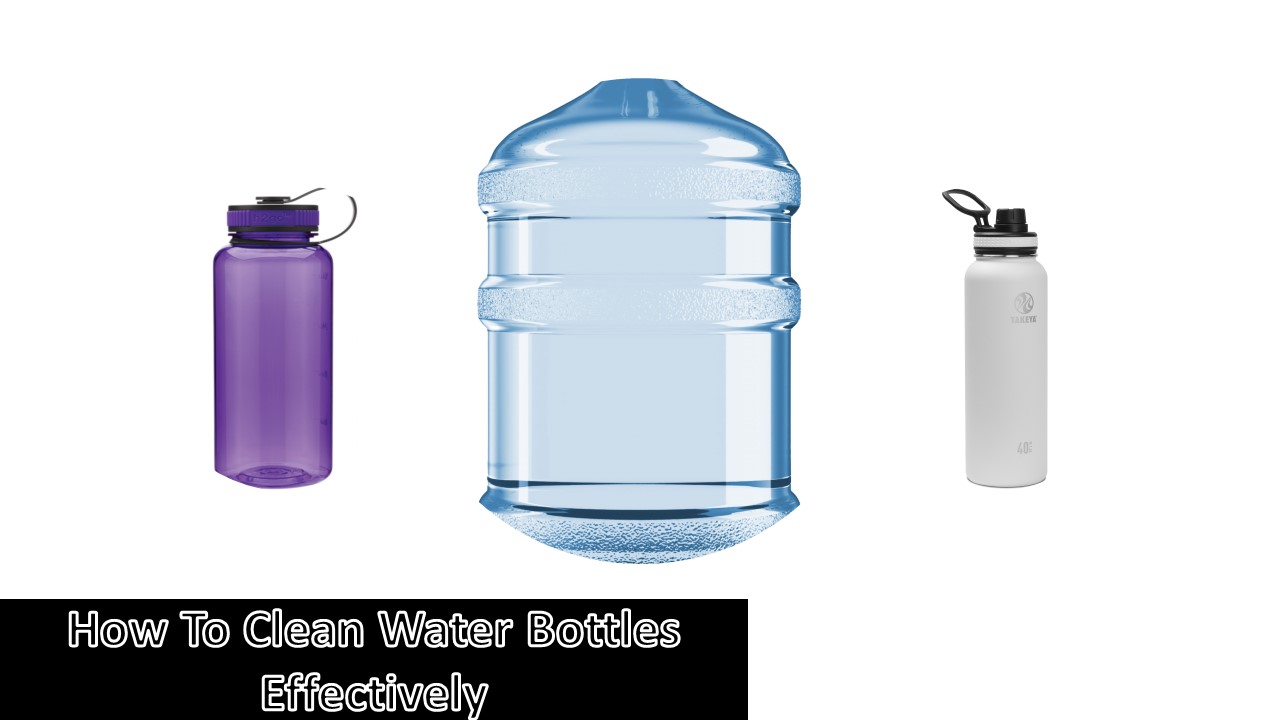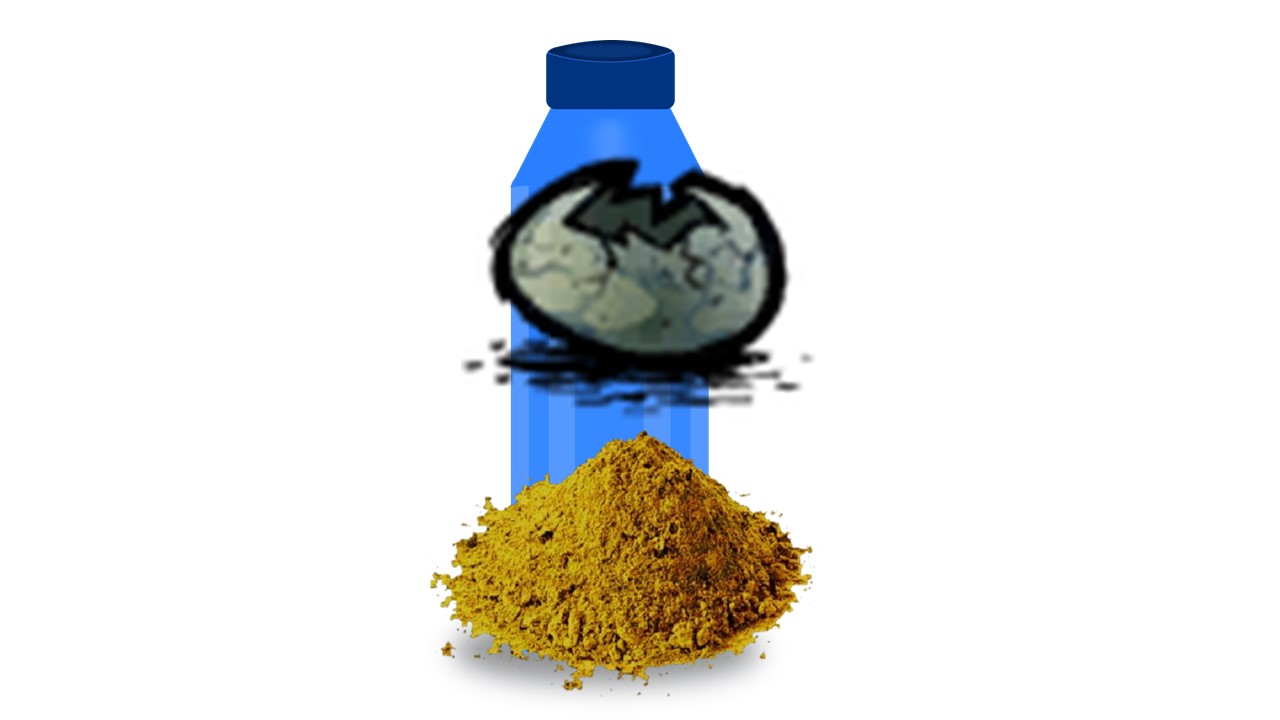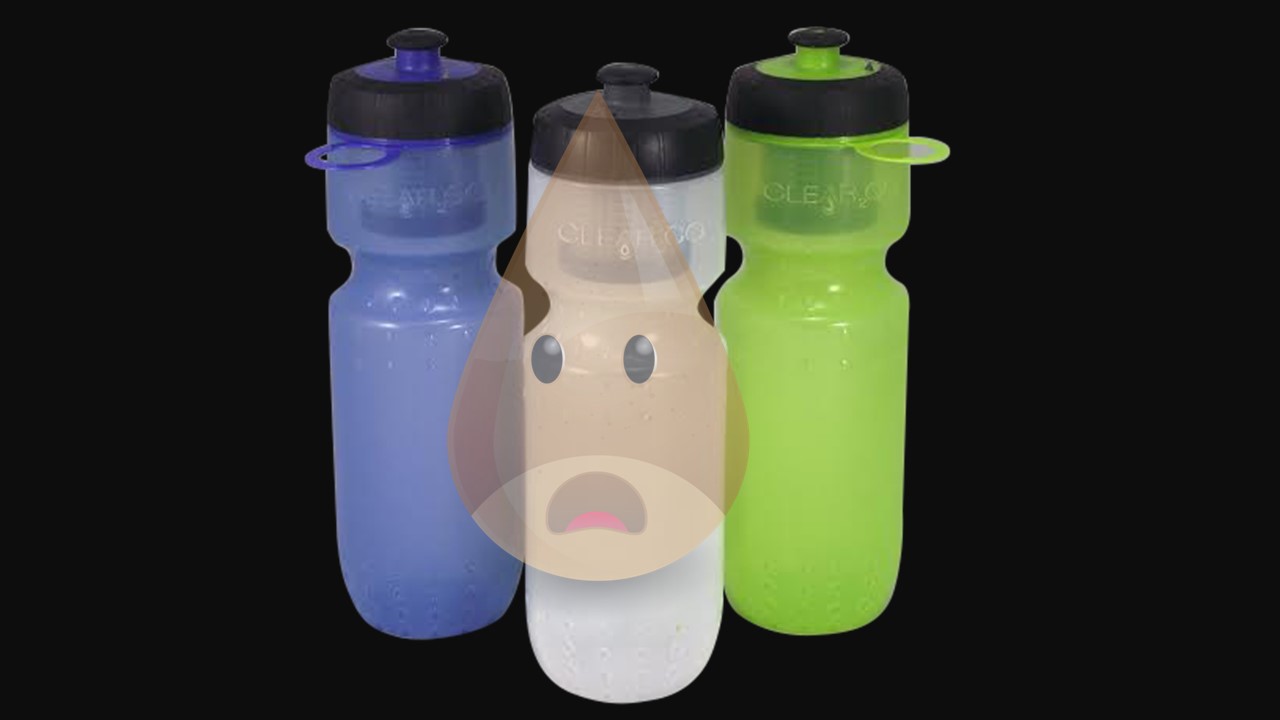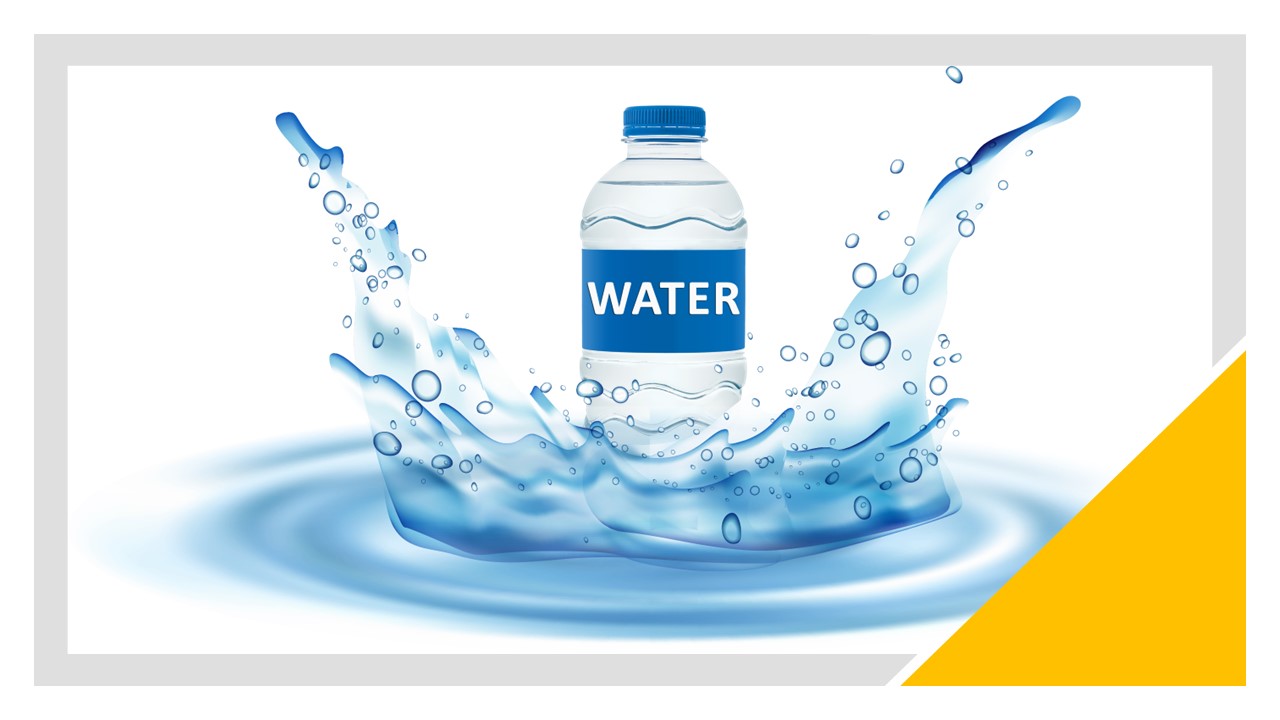Why Does My Water Bottle Smell Even After Washing – Should I Be Concerned?
You have cleaned your water bottle but your question is “why does my water bottle smell even after washing?” While it’s great to stay hydrated and reduce your environmental footprint, your trusty water bottle could be harboring dangerous bacteria and germs that can make you sick.
In fact, a study has shown that water bottles can be up to 100 times more contaminated than a typical pet’s food bowl or even your own toilet seat! But it’s not just the germs that should worry you. That funky smell coming from your water bottle even after washing it could be a sign of a much more sinister problem.
According to research, those unpleasant odors are often caused by biofilm, a slimy layer of bacteria that can accumulate in hard-to-reach corners of your bottle, even after multiple washings. But don’t panic just yet. There are steps you can take to keep your water bottle clean, odorless and safe to use.
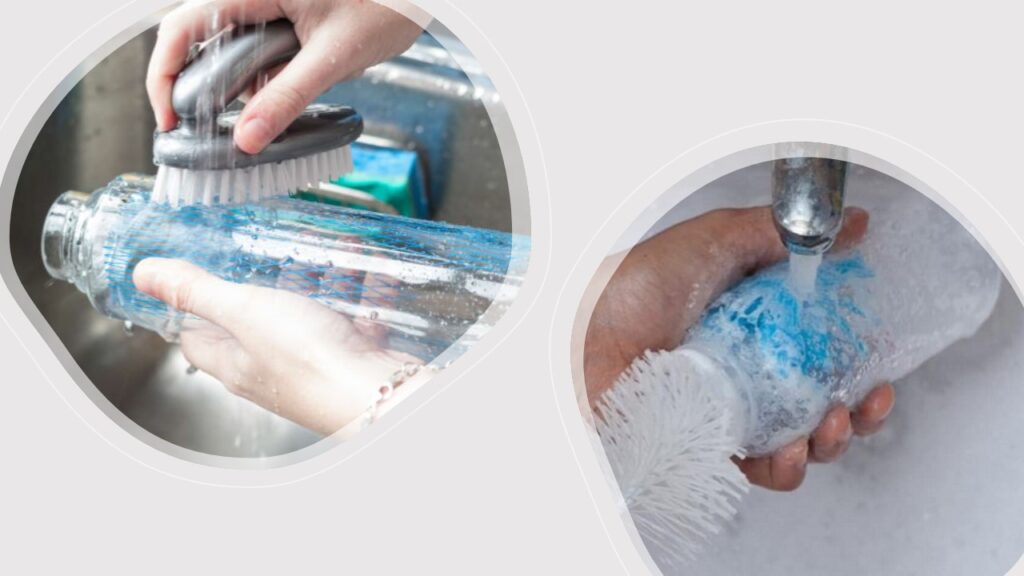
Why Does My Water Bottle Smell Even After Washing
Even if you wash your water bottle with soap and water, you may still notice a lingering smell. This is because there are a few common causes of unpleasant odors in water bottles that can be difficult to eliminate with a simple wash.
Here are some of the most common reasons:
1. Using Harsh Cleaning Chemicals
Using harsh cleaning chemicals to clean a water bottle can cause it to smell even after washing due to chemical residues left behind. Harsh chemicals, such as bleach or certain abrasive cleaning agents, may not fully rinse off the water bottle’s surface, leaving behind tiny traces of the chemical compounds.
These residues can interact with the materials of the water bottle, particularly in plastic bottles, causing a reaction that leads to lingering odors. Additionally, the remnants of these chemicals may mix with the beverages you pour into the bottle, affecting the taste and potentially posing health risks.
To avoid this issue, it is best to use milder cleaning agents like dish soap or natural solutions such as vinegar and baking soda. These alternatives are effective at cleaning and deodorizing without leaving any harmful residues.
Thoroughly rinsing the water bottle after cleaning is also crucial to ensure that no traces of cleaning agents remain, resulting in a clean, odor-free bottle for safe and enjoyable hydration.
2. Not Drying The Bottle Properly After Washing
Not drying the water bottle properly after washing can cause it to smell even after cleaning due to the moisture left behind. When a water bottle is not dried thoroughly, any remaining water or moisture inside the bottle creates a favorable environment for bacterial growth.
Bacteria flourish in damp and dark conditions, and if moisture is trapped in the bottle, it can lead to the formation of biofilms or colonies of bacteria. These biofilms can produce unpleasant odors, even if the bottle was initially cleaned with soap and water.
Additionally, if the water bottle is stored with the cap or lid on while still damp, the lack of airflow can exacerbate the problem, as it creates a closed environment where bacteria can multiply rapidly.
To avoid this issue, it’s essential to allow the water bottle to air dry completely after washing. Remove the cap or lid and keep the bottle upside down on a dish rack or drying mat, allowing air to circulate and moisture to evaporate.
Ensuring that the bottle is thoroughly dried will prevent the growth of bacteria and help maintain a fresh, odor-free water bottle for safe and hygienic hydration.
3. Bacteria And Mold
Water bottles provide a warm and moist environment that is perfect for bacteria and mold to grow. If you don’t wash your water bottle properly, bacteria and mold can accumulate in the bottle and cause a foul smell.
4. Lingering Residue
If you use your water bottle to drink beverages like juice, coffee, or tea, the residue from these drinks can cling to the walls of your bottle, leading to a lingering odor even after washing.
5. Insufficient Cleaning
Sometimes, washing your water bottle with soap and water may not be enough to remove stubborn odors. In such cases, you may need to use specialized cleaning products or methods to get rid of the smell.
6. Material
Water bottles made of certain materials like plastic or metal can absorb odors more easily than others. This can make it more challenging to get rid of unpleasant smells even with regular washing.
7. Environment
Leaving your water bottle in a hot and humid environment, like in your car or gym bag, can encourage the growth of bacteria and mold, leading to unpleasant odors.
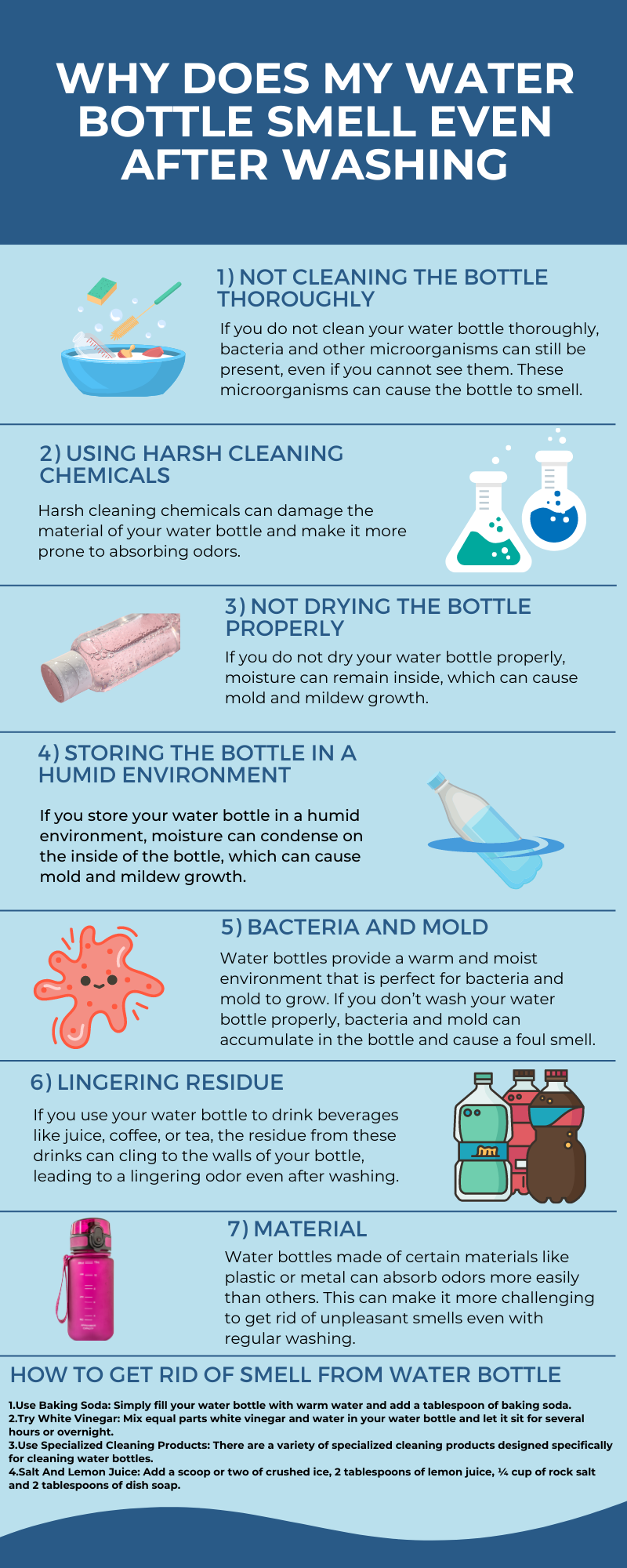
The Science Behind Why Water Bottles Can Still Smell Even After Washing
If you are wondering and asking “Why Does My Water Bottle Smell Even After Washing,” then the science behind why water bottles still smell even after washing lies in the fact that some bacteria and mold can develop a biofilm inside the bottle, protecting them from being washed away.
Biofilms are thin layers of microorganisms that attach to surfaces and form a complex matrix of proteins and sugars that are resistant to cleaning agents. Once these biofilms form, they can harbor bacteria and mold, leading to unpleasant odors even after washing.
Additionally, some materials used to make water bottles, such as plastic, can have microscopic pores that trap bacteria and mold, making it difficult to completely clean the bottle.
The porous nature of plastic can also cause it to absorb flavors and odors from drinks, leading to lingering smells even after washing.
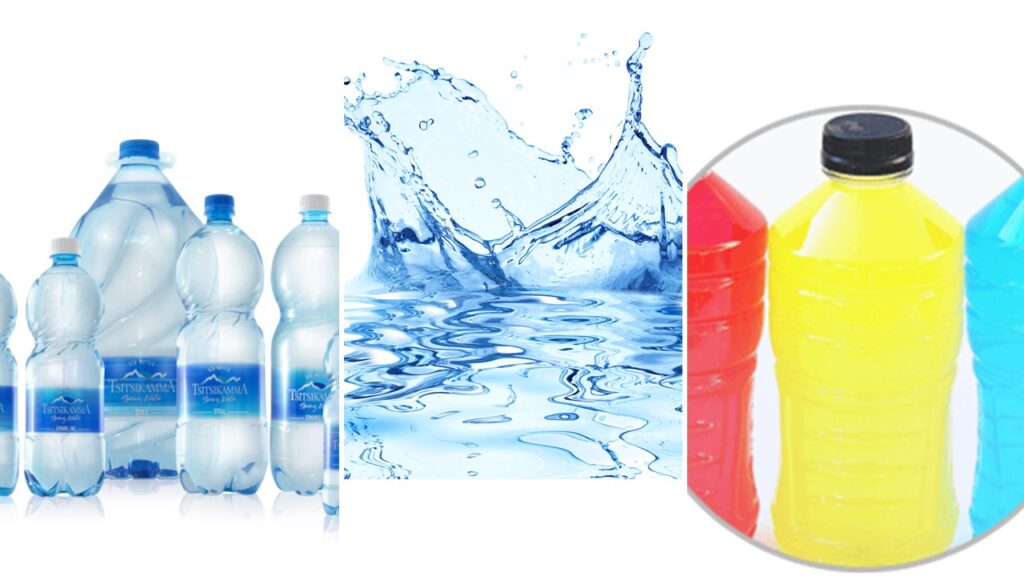
Tips On How To Get Rid Of Smell From Water Bottle (Why Does My Water Bottle Smell Even After Washing)
Here are some practical solutions for getting rid of unpleasant odors in water bottles:
1. Use Baking Soda
Baking soda is a natural deodorizer and can help to neutralize odors in your water bottle. To use baking soda, simply fill your water bottle with warm water and add a tablespoon of baking soda.
Shake the bottle to ensure the baking soda dissolves and let it sit for a few hours or overnight. You can use a bottle brush to scrub the inside of the bottle too to ensure it is thoroughly cleaned. Rinse thoroughly with warm water and dry.
Benefits: Baking soda is an affordable and readily available solution that can effectively neutralize odors.
Drawbacks: Baking soda can leave a residue that requires extra rinsing to remove.
2. Try White Vinegar
Vinegar is another natural deodorizer that can help to eliminate unpleasant odors. Mix equal parts white vinegar and water in your water bottle and let it sit for several hours or overnight. Scrub the inside of the bottle with a bottle brush. Rinse thoroughly with warm water and dry.
Benefits: White Vinegar is a non-toxic solution that can effectively eliminate odors.
Drawbacks: The strong smell of vinegar can be difficult to remove. If you allow the bottle to dry, the smell should vanish.
3. Use Specialized Cleaning Products
There are a variety of specialized cleaning products designed specifically for cleaning water bottles. These products can be found at most stores that sell water bottles or online. Follow the instructions on the product carefully.
Benefits: These products are designed to effectively eliminate odors and can be more convenient than using homemade solutions.
Drawbacks: Specialized cleaning products can be more expensive than other cleaning solutions.
4. Salt And Lemon Juice
Salt is a natural abrasive that can help remove stubborn stains and odors from your water bottle when combined with lemon juice. Add a scoop or two of crushed ice, 2 tablespoons of lemon juice, ¼ cup of rock salt and 2 tablespoons of dish soap.
Screw the lid and let it sit for 1 minute. Shake vigorously and then rinse thoroughly with clean hot water. Allow it to dry before using it again.
Benefits: Salt and lemon can be found easily.
Drawback: Lemon juice may smell a bit but it will vanish before the bottle dries.
Regardless of the method you choose, be sure to rinse your water bottle thoroughly with warm water and dry it completely before using it again. Avoid using bleach or harsh chemicals, as these can be harmful to your health and damage your water bottle.
By using these tips, you can effectively eliminate unpleasant odors in your water bottle and ensure that it is clean and safe to use.
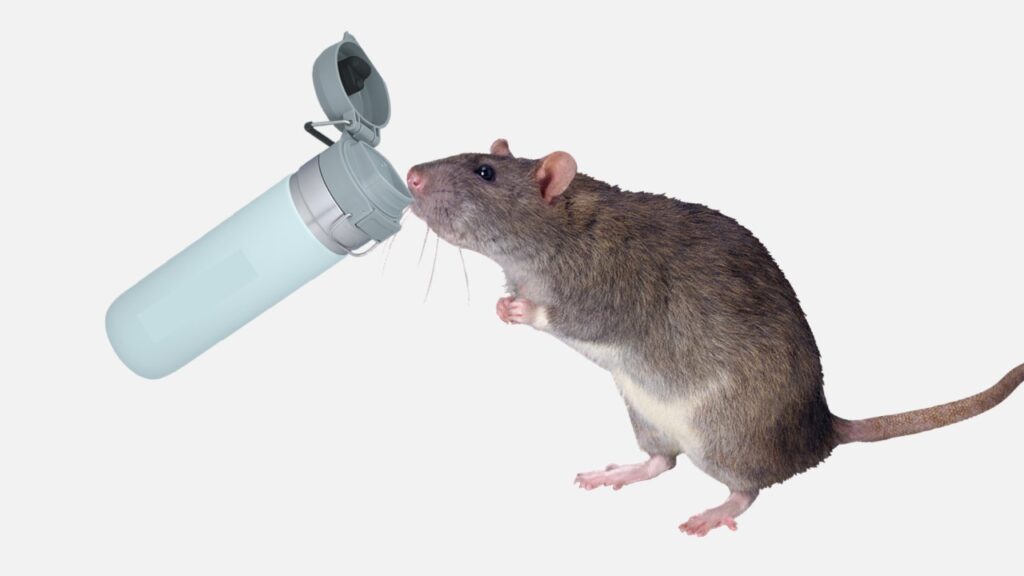
How To Prevent Odor From Forming In Your Water Bottle
If you are looking for an answer to “Why Does My Water Bottle Smell Even After Washing?” why don’t you try to prevent odor in the first place?
Preventing odors from forming in your water bottle is much easier than dealing with them after they develop. Here are some simple ways to prevent odors from forming in your water bottle:
1. Wash your water bottle regularly: Make it a habit to wash your water bottle daily, especially if you use it frequently or have left it sitting for an extended period.
Use soap and warm water to thoroughly clean the bottle, paying special attention to hard-to-reach areas. Rinse it thoroughly and let it air dry completely.
2. Allow your water bottle to dry completely: After washing your water bottle, be sure to let it dry completely before using it again. Bacteria and mold thrive in moist environments, so allowing your water bottle to dry thoroughly can help prevent odors from developing.
3. Avoid leaving your water bottle in hot, humid environments: Heat and humidity can create the perfect environment for bacteria and mold to grow. Avoid leaving your water bottle in your car or other hot, humid environments for extended periods of time.
4. Store your water bottle in a cool, dry place: When you’re not using your water bottle, store it in a cool, dry place. This can help prevent the growth of bacteria and mold.
5. Use a straw or spout cover: If your water bottle has a straw or spout, consider using a cover to prevent bacteria from accumulating in these hard-to-clean areas.
6. Use hot water: Use hot water to wash your water bottle as it can help to kill bacteria and remove any lingering odors from mold and bacteria.
By following these simple tips, you can help prevent odors from developing in your water bottle and ensure that it stays clean and safe to use.

Health Risks Associated With Using A Smelly Water Bottle (Why Does My Water Bottle Smell Even After Washing)
Using a smelly water bottle can be harmful to your health because it can lead to the consumption of contaminated water.
The unpleasant odor in your water bottle is often caused by bacteria or mold that have accumulated over time. Drinking water that is contaminated with these microorganisms can result in a range of health risks, including:
- Gastrointestinal Problems: Consuming contaminated water can cause gastrointestinal problems, such as diarrhea, nausea, vomiting, and stomach cramps.
- Infections: Bacteria and mold in your water bottle can cause infections if they enter your body through your mouth. Infections can occur in your throat, sinuses, and respiratory system, leading to symptoms like sore throat, cough, and fever.
- Weakened Immune System: Drinking contaminated water can also weaken your immune system, making you more susceptible to other infections and illnesses.
- Allergic Reactions: Mold spores in your water bottle can trigger allergic reactions in some people. Symptoms of mold allergies can include sneezing, coughing, runny nose, and skin rashes.
It’s important to note that the risk of health problems from using a smelly water bottle is higher for people with weakened immune systems, such as young children, elderly people, and individuals with chronic illnesses.
Therefore, it’s essential to take steps to prevent odors from developing in your water bottle and to clean it thoroughly if it does develop an unpleasant odor.

How To Avoid Getting Sick From A Smelly Water Bottle (Why Does My Water Bottle Smell Even After Washing)
To avoid getting sick from a smelly water bottle, follow these essential preventive measures and good hygiene practices:
- Regular Cleaning: Clean your water bottle regularly and thoroughly with hot, soapy water to remove any bacteria or germs that may cause illness.
- Deep Cleaning: Perform a deep cleaning at least once a week using a solution of equal parts white vinegar and water or baking soda and water to eliminate stubborn odors and bacteria.
- Dry Thoroughly: After washing, ensure your water bottle dries completely before using it again. Moisture can promote bacterial growth, leading to potential health risks.
- Avoid Storing Beverages Long-Term: Refrain from leaving beverages, especially sugary or acidic ones, in the water bottle for extended periods, as they can create an environment conducive to bacterial growth.
- Use BPA-Free and Non-Toxic Bottles: Choose water bottles made from BPA-free and food-grade materials to reduce the risk of harmful chemical leaching.
- Do Not Share Your Bottle: Do not share your water bottle with others, as it can spread germs and bacteria.
- Monitor Your Health: Pay attention to any changes in your health after using a smelly water bottle. If you experience any symptoms like stomach discomfort or gastrointestinal issues, stop using the bottle and consult a healthcare professional.
- Replace Old or Damaged Bottles: Regularly inspect your water bottle for signs of wear or damage. Replace it if you notice cracks, broken seals, or degraded materials.
- Avoid Excessive Heat or Freezing: Avoid extreme temperature conditions, such as leaving your water bottle in a hot car or freezing it for too long, as they can affect the integrity of the bottle and promote bacterial growth.
- Use Portable Cleaning Tablets or Wipes: When you’re on the go or traveling, carry portable water bottle cleaning tablets or wipes to refresh the bottle when access to soap and water is limited.
- Store in a Clean Environment: When not in use, store your water bottle in a clean and dry area to minimize contamination.
Common Mistakes to Avoid When Cleaning Water Bottles
Here are common mistakes to avoid during water bottle cleaning and tips on how to prevent lingering odors:
1. Incomplete Rinse
Mistake: Failing to rinse the water bottle thoroughly after washing can leave behind soap residue, contributing to lingering odors.
Tip: Always rinse the water bottle multiple times with warm water to ensure all soap is removed.
2. Ignoring Removable Parts
Mistake: Neglecting to clean the removable parts, such as the lid, spout, or straw, can lead to bacterial buildup and persistent odors.
Tip: Disassemble the water bottle completely before cleaning and wash each part separately to ensure a thorough cleaning.
3. Using Harsh Chemicals
Mistake: Using harsh cleaning agents like bleach or abrasive cleaners can leave chemical residues that cause unpleasant smells.
Tip: Opt for milder cleaning solutions like dish soap or natural remedies such as vinegar and baking soda to avoid leaving behind any harmful residues.
4. Insufficient Drying
Mistake: Not drying the water bottle properly after washing can create a damp environment that fosters bacterial growth and odors.
Tip: Allow the water bottle to air dry completely by keeping it upside down on a dish rack or drying mat and store it with the cap off to promote proper ventilation.
5. Ignoring Mold or Mildew
Mistake: Overlooking the presence of mold or mildew in hard-to-reach areas can lead to persistent musty smells.
Tip: Regularly inspect the water bottle for signs of mold or mildew and use a bottle brush or toothbrush to reach difficult spots for a thorough clean.
6. Using the Wrong Brush
Mistake: Using a brush that is too small or unable to reach all parts of the water bottle may result in inadequate cleaning.
Tip: Invest in a long-handled bottle brush specifically designed for water bottles, ensuring you can clean all areas effectively.
7. Storing a Wet Bottle
Mistake: Putting the water bottle away while it’s still damp can promote bacterial growth and odors.
Tip: Ensure the water bottle is fully dry before storing it, and keep it in a clean, dry place to prevent moisture accumulation.
8. Using the Same Bottle for Different Beverages
Mistake: Reusing the water bottle without proper cleaning after holding different beverages can lead to cross-contamination and smells.
Tip: Clean the water bottle thoroughly each time you switch between beverages to prevent flavors or odors from lingering.
The Benefits Of Staying Hydrated With A Clean And Odor-Free Water Bottle (Why Does My Water Bottle Smell Even After Washing)
Staying hydrated is essential for overall health and well-being, and using a clean and odor-free water bottle can have many benefits. Here are some of the key benefits of staying hydrated with a clean water bottle:
1. Improved Physical Performance
Dehydration can lead to fatigue, reduced endurance, and impaired physical performance. Staying hydrated with a clean water bottle can help to maintain optimal hydration levels and improve physical performance during exercise or other physical activities.
2. Better Cognitive Function
Studies have shown that even mild dehydration can affect cognitive function, leading to reduced concentration, mood, and overall brain function. Staying hydrated with a clean water bottle can help to improve cognitive function and mental clarity.
3. Enhanced Immune System Function
Drinking enough water is essential for maintaining a healthy immune system, which helps to protect the body against illness and disease. Using a clean water bottle can help to prevent the buildup of harmful bacteria and other contaminants that can compromise immune system function.
4. Improved Digestion
Drinking enough water is important for maintaining healthy digestion and preventing constipation. Using a clean water bottle can help to prevent the buildup of harmful bacteria that can lead to digestive problems.
5. Overall Health And Wellbeing
Staying hydrated with a clean water bottle is essential for overall health and well-being. It can help to maintain healthy skin, promote weight loss, and prevent a range of health problems associated with dehydration.
By staying hydrated with a clean water bottle, you can enjoy these benefits and maintain optimal health and well-being.
Examples Of High-Quality Water Bottles That Are Easy To Clean And Maintain
There are several high-quality water bottles available in the market that are designed to be easy to clean and maintain. Here are some examples:
Product Image | Product Name | Key Features | Rating | Price |
| ||||
| ||||
| ||||
| ||||
| ||||
| ||||
| ||||
| ||||
| ||||
|
These are just a few examples of high-quality water bottles that are easy to clean and maintain. When choosing a water bottle, it’s important to consider your specific needs and preferences, such as size, material, and design.
With the right water bottle, you can ensure that you’re staying hydrated while also maintaining good hygiene.
Features To Look For In A High-Quality Water Bottle That Is Easy To Clean And Maintain Why Does My Water Bottle Smell Even After Washing)
When looking for a high-quality water bottle that is easy to clean and maintain, there are several features to consider. Here are some of the most important:
- Material: Choose a water bottle made of high-quality, non-porous materials that are easy to clean, such as stainless steel, glass, or BPA-free plastic.
- Wide Mouth: A water bottle with a wide mouth makes it easier to clean and dry, as well as add ice or other ingredients.
- Removable Parts: Look for a water bottle with removable parts, such as a cap or straw, that can be easily taken apart and cleaned thoroughly.
- Dishwasher Safe: Check if the water bottle is dishwasher safe for easy and convenient cleaning.
- Leak-Proof: A leak-proof water bottle will prevent spills and leaks, which can lead to unpleasant odors and make cleaning more difficult.
- Odor-Resistant: Some water bottles are designed to be odor-resistant, which helps to prevent unpleasant smells from lingering even after cleaning.
- Durable: Choose a water bottle that is durable and can withstand regular use and cleaning without cracking, denting, or breaking.
The Bottom Line On Why Does My Water Bottle Smell Even After Washing
So, why does my water bottle smell even after washing? There are many reasons why it may smell even after washing but keeping your water bottle clean and odor-free is essential for your health and well-being.
By following simple tips such as washing your water bottle regularly, allowing it to dry completely, and using practical cleaning solutions like baking soda or vinegar, you can prevent unpleasant odors from forming and avoid the potential health risks associated with using a smelly water bottle.
With a high-quality water bottle that’s easy to clean and maintain, you can stay hydrated and healthy while on-the-go.










